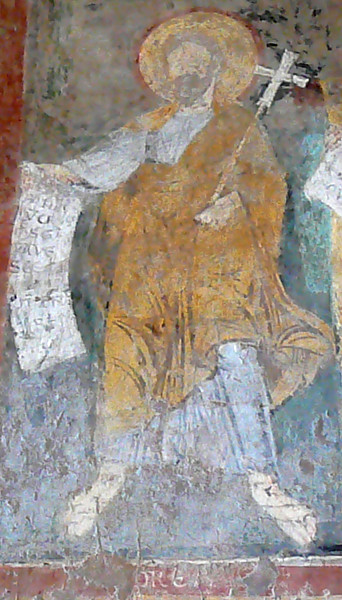The cultus of St. Gengulphus (†AD 760) does not appear to have ever been especially large. He was one of the rare "secular" saints of the first millennium, being neither a cleric nor a religious, but rather a martyr of sorts. He lived in Burgundy, and many churches in France still bear his name (or some
variant thereof), as do some German churches.
His hagiography is miraculous from
its first recounting, and serves as an interesting counterpoint to later women saints who suffered greatly under their wicked husbands. Gengulphus suffered the indignity of a straying wife, who began an adulterous affair with a clerk of some unknown rank while her husband was away from home. When the nobleman was finally convinced of his wife's unfaithfulness, he advised her to repent and himself retired to a distant estate, rather than punish her. The two adulterers feared for their safety and plotted to kill the saintly husband, and one night the clerk slipped into his bedroom and dealt him a mortal blow. After returning to his mistress, the clerk quickly died in the manner of Arius and the wife was ironically cursed after replying to news of miracles performed at her husband's grave with, "If Gengulph can work miracles, then so can my arse." One day a week for the rest of her life, an ignoble sound erupted constantly from the part of the body she thus indicated.
The story of St. Gengulphus was not popular enough to warrant inclusion in the
Golden Legend, and his mention in the martyrology of the Roman Breviary for May 11 is terse:
Varennis, in Gallia, sancti Gangulphi Martyris. Nevertheless, many of his
relics can still be found in the areas surrounding his original cult, as can the aforementioned churches named in his honor.
Some later legends claim that Gengulphus had retired from married life to become a hermit, but there is no such indication in the earliest hagiographies. He never divorced his wife nor sought to annul his marriage. In many ways he is the kind of saint needed in our troubles times. The culture of divorce and "easy outs" from bad marriages has permeated the Church herself. Gengulphus suffered greatly from a bad spouse, but did not use this injustice as an excuse to commit sin.







